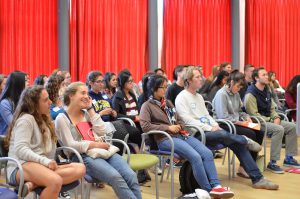Miguel Rodriguez
Staff Writer
The University of California, Santa Barbara hosted its first annual mental health conference on Saturday, May 28 at the Student Resource Center. Titled #HowAreYou, the event centered around combating the negative stigma surrounding mental health issues.
“Conferences, workshops and panels like these are valuable because they remind students to return to and remember to honor the humanity that drives their advocacy in the first place,” said Caroline Nguyen, an organizer of the UC Irvine mental health conference.
Nguyen said UC-wide expansion of the conference has been in the talks for some time.
“[S]tudents of today are attentively, triumphantly advocating for their own needs and being tireless agents of change — using their knowledge as organizers, peers, activists and educators to drive progress in the greatest capacity their roles allow.”
The event came in multiple segments, with numerous workshops, panels and talks held simultaneously at any given time.
Third year computer science major Nicholas Frey led a presentation on manliness, focusing on the pressures that society has on men to be a certain way, and how they affect men’s mental health. His presentation was short, which allowed for a back-and-forth discussion between him and his audience.
“Honestly I wasn’t expecting it to become a discussion, but I was very pleased with how the dynamics of the conversation went,” Frey said.
After the workshops and presentations, numerous student-led panels allowed attendees to talk about their mental health issues, and ways in which they handled their experience.
The conferences’ coordinators put in over six months of work into making sure that things ran as they expected it to. The event included a self-care room available for any attendee to use if they needed a break.

Image Courtesy of Madison Frame
“Honestly, I can’t say I’m surprised.” said Madison Frame, a student coordinator. “We put a lot of work into this, double and triple checking everything to make sure that today went as smoothly as it is. On top of our preparations, things are just overall going well for us like the power of the panelists and the workshops.”
“Of course, the purpose of these conferences is to raise awareness of mental health,” Frame said. “Because people have these preconceived assumptions of what it is to have a mental issue, it’s very hard for victims to come out and seek help. Hopefully, by using these conferences, we are able to shed some light and de-stigmatize these issues.”
UPDATES
June 1, 12:38 p.m.: A quote attributing Lacy Wright has been corrected to attribute Caroline Nguyen.
This article was originally published at 2:29 p.m.











